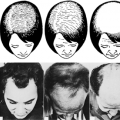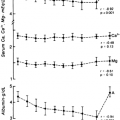PSEUDO–CUSHING SYNDROME
Part of “CHAPTER 75 – CUSHING SYNDROME“
Hypercortisolism may exist in patients who do not have true Cushing syndrome. These patients experience obesity, depression, alcoholism, anorexia nervosa, bulimia, or acute stress. Because their clinical presentation and biochemical findings overlap with those of patients with Cushing syndrome, the differential diagnosis can be challenging.
OBESITY
Obese people, particularly those with abdominal or upper-body-segment obesity, share many of the metabolic, hormonal, and behavioral findings observed in Cushing syndrome. These include diabetes mellitus, hypertension, myocardial infarction, insomnia, and depression.61 Obesity is associated with increased cortisol production, as indicated by high cortisol secretion rates and levels of urinary 17-hydroxycorticosteroids, but normal or slightly diminished serum cortisol levels; these findings suggest an increased metabolic clearance rate for cortisol.62 Urinary free cortisol is increased in proportion to the waist-to-hip ratio; these individuals also exhibit increased cortisol responsiveness to ACTH stimulation and to physical and mental stress.63
Stay updated, free articles. Join our Telegram channel

Full access? Get Clinical Tree





